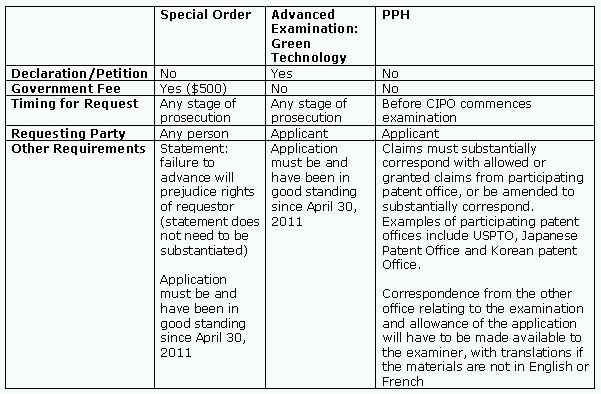Recent amendments to the Canadian Patent Rules and changes to Canadian Patent Office practice now provide patent applicants with greater opportunities for expediting patent examination before the Canadian Intellectual Property Office ("CIPO").
In Canada, patent examination can be deferred for up to five years from the filing date. But due to a backlog at the Patent Office, once examination is requested, there can be a delay of between 18-30 months and sometime longer before an application reaches a patent examiner for substantive examination.
There are a number of ways to speed up the patent examination process in Canada. An application can be advanced for examination in Canada if:
- a request is made for a Special Order,
- the application relates to a green technology, or
- if the application meets the requirements of the Patent Prosecution Highway ("PPH") with a participating patent office.
The requirements for each of these procedures are summarized below:

A request for expedited examination cannot be made until an application is laid open for public inspection. An application is laid open in Canada 18 months after the earliest priority date or the filing date if there is no priority claim. An application can be laid open for public inspection sooner, if a request is made.
Once a request for expedited examination is approved by the Patent Office, an applicant should expect to receive a first examiner's report (or notice of allowance) within two to three months.
In addition to the requirements summarized above, the following further requirements apply to advanced examination in Canada.
Special Order. If a Special Order is granted, then examiner's reports will require a response within three months. If for any reason an extension of time is requested, or the application is abandoned and reinstated, then Special Order status will be lost and the applicant will be precluded from requesting a further Special Order. This does not apply to third parties who may wish to request a further Special Order.
Green technology. The applicant declaration must indicate that the invention relates to "technology the commercialization of which would help to resolve or mitigate environmental impacts or to conserve the natural environment and resources."
Like Special Orders, the term for response is three months. The consequences of abandonment are also the same as for a Special Order.
Patent Prosecution Highway ("PPH"). The PPH permits CIPO to take advantage of search and examination results for an application filed in a participating office. Canada currently has a PPH agreement with the USPTO and PPH pilot projects with the following six patent offices around the world: Japan Patent Office ("JPO"), Korean Intellectual Property Office ("KIPO"); Danish Patent and Trademark Office ("DKPTO"); German Patent and Trademark Office ("DPMA"); Spanish Patent and Trademark Office ("SPTO"); and National Board of Patents and Registrations of Finland ("NBPR").
CIPO has also established a PCT-PPH pilot project for PCT applications entering the Canadian national phase where it was the International Searching Authority and/or International Preliminary Examination Authority of the PCT application. The pilot is scheduled to end January 31, 2013.
Each of the pilot programs may be extended, or terminated early. The PPH agreement with the USPTO currently has no time limit.
Canada is a signatory to the Mottainai agreement, and so agreements with the USPTO, JPO, SPTO and NBPR do not limit these offices to being the office of first filing in order for the Canadian application to benefit from their search and examination results.
Unlike Special Order and PPH, examiner's reports ordinarily have a six-month term for response. Another difference is that if an extension of time is requested, or the application is abandoned and reinstated, the application will continue in the PPH pilot program.
Applications in the PPH pilot program, while expedited, will still be examined for compliance with Canadian requirements.
Comparison with advanced examination in the USPTO. Unlike the USPTO, there is no provision to allow the Commissioner to order advanced examination to expedite the business of the office, and there are no provisions that would permit the government to advance examination of inventions relevant to the public service.
There are no provisions for advancing examination without fee based on the age or health of the applicant or where the invention is directed at countering terrorism.
Finally, there are presently no other programs for advancing examination before the Canadian Intellectual Property Office, such as the USPTO Accelerated Examination Program.
The preceding is intended as a timely update on Canadian intellectual property and technology law. The content is informational only and does not constitute legal or professional advice. To obtain such advice, please communicate with our offices directly.
